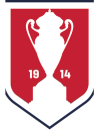ATLANTA (Nov. 3, 2025) – U.S. Women’s Deaf National Team head coach Amy Griffin has named her final roster to represent the United States at the 2025 Deaflympics from Nov. 12-25 in Tokyo, Japan. The tournament will be the last for Griffin and her assistant coach Joy Fawcett leading the Deaf WNT, while veteran players Sydney Andrews, Emily Spreeman and Kate Ward will also retire from international soccer following the competition.
“As we get ready to compete at the 2025 Deaflympics in Tokyo, I couldn’t be more excited about this group,” Griffin said. “The mix of experienced players and new talent will be special to watch as we come together one last time on this stage. Along with our incredible staff, it’s a privilege to share this journey with the U.S. Women’s Deaf National Team at such an extraordinary event. We know every country will be coming for us, and that challenge is what keeps us sharp, connected, and proud to represent the Deaf and hard of hearing communities, the sport that binds us, and the United States.
“This Deaflympics will be deeply personal for Joy and myself. What began 10 years ago as a chance to help the team has grown into a mission to create change — to build more opportunities for Deaf players, to shape an environment worthy of the elite athletes and amazing people who have the honor of wearing the crest, and to bring well-earned attention to this community. We thought we were stepping in to support the players, but they’re the ones who have supported and taught us. Their trust, grace, and love for one another and anyone who crosses their path has built something powerful and being part of that has been the one of greatest gifts of my career. I’ll miss the chaos and the calm, the challenges and celebrations — all of it — because this team has changed me in ways I’ll never forget.”
Holding a dominant 40W-0L-1D all-time record since beginning play in 2005, the Deaf WNT heads to Tokyo in search of a record fifth Deaflympics gold medal and eighth overall world championship title. The USA has claimed gold in women’s football at each of the previous four Deaflympics where the Deaf WNT participated in 2005, 2009, 2013 and 2022, and has also won three DIFA World Deaf Football Championship tournaments in 2012, 2016 and 2023.
The Deaf WNT’s participation in the Deaflympics reflects the Federation’s commitment to the U.S. Way, by investing in resources, infrastructure, and comprehensive support for the Extended National Teams, including the Deaf National Teams, to ensure they are fully prepared to compete and succeed on the world stage.
U.S. WOMEN’S DEAF NATIONAL TEAM ROSTER (Hometown; Caps/Goals):
GOALKEEPERS (3): Taegan Ferrin^* (Centerville, Utah; 9/0), Sierra Kaspar (Fort Worth, Texas; 0/0), Meghan Maiwald (Gilroy, Calif.; 14/0)
DEFENDERS (7): Sydney Andrews^* (Wichita, Kan.; 30/1), Paige Beaudry^* (Riverview, Mich.; 12/1), Erin Cembrale^* (Oyster Bay, N.Y.; 13/5), Casey King^ (Bexley, Ohio; 8/5), Melia Lenert (Long Beach, Calif.; 2/0), Chelsey Tumey (Peoria, Ariz.; 2/0), Faith Wylie^* (Decatur, Texas; 13/6)
MIDFIELDERS (9): Payton DeGraw^ (Salt Lake City, Utah; 5/0), Gracie Fitzgerald^* (Georgetown, Ind.; 20/4), Holly Hunter^ (Temecula, Calif.; 6/7), Ani Khachadourian^* (Cary, N.C.; 10/8), Emma Neff^ (Oakwood, Ohio; 6/1), Paris Price^* (Fall City, Wash.; 14/2), Sabina Shysh^ (Tucson, Ariz.; 4/1), Kate Ward^* (Atlanta, Ga.; 31/8), Mia White^* (Littleton, Colo.; 14/1)
FORWARDS (4): Josephine Blazic (East Tawas, Mich.; 1/1), Tia LaBrecque (Raynham, Mass.; 2/1), Sophie Post^* (Murray, Utah; 14/9), Emily Spreeman^* (Fountain Valley, Calif.; 26/38)
^Part of squad at 2023 World Deaf Football Championships
*Part of squad at 2022 Deaflympics
LAST DANCE FOR DEAF WNT LEGENDS, COACHES
Set to retire from the Deaf WNT at the end of 2025, the Tokyo Games will mark the last international matches for the team’s three longest-tenured players in defender Sydney Andrews (30 caps, seven World Championship rosters), forward Emily Spreeman (26 caps, five World Championship rosters) and midfielder Kate Ward (31 caps, seven World Championship rosters). The three most decorated players in Deaf WNT history, Andrews, Spreeman and Ward hold a combined 87 appearances and 19 major tournament roster selections between them. Andrews was voted U.S. Soccer’s 2024 Female Deaf Player of the Year, Spreeman, whose 38 career goals are the most in Deaf WNT history, won the same honor in 2023, while Ward’s 31 caps are the most appearances in team history.
Meanwhile, the Tokyo Games will also be the last tournament for head coach Amy Griffin and assistant Joy Fawcett. Having started with the Deaf WNT in 2016, the duo has amassed a 19W-0L-1D overall record, leading the side to two World Deaf Football Championship titles in 2016 and 2023, as well as the gold medal at the 2022 Deaflympics. As players, both were part of the U.S. Women’s National Team’s World Cup-winning side in 1991, while Fawcett also represented the U.S. at the 1995, 1999 and 2003 tournaments, winning another World Cup in 1999 and two Olympic gold medals in 1996 and 2004.
GAME SCHEDULE/TOURNAMENT FORMAT
The Women’s Football competition at the 2025 Deaflympics will be a four-team round-robin tournament, with the USA facing hosts Japan (Nov. 14), Australia (Nov. 18) and Great Britain (Nov. 22). All group stage matches will kick off at 10 p.m. ET (noon local time the following day in Japan). The group stage will determine rankings for the medal round matches on Nov. 25, with the top two teams playing for gold and third and fourth place teams playing for bronze.
A LEGACY OF SUCCESS FOR DEAF WNT
The Deaf WNT took its initial steps in 1999, when the first U.S. side won the St. John’s Tournament, a small-sided competition played in London, England. Two years later, the team was again victorious at 2001 De Hearne Kortrijk Indoor Tournament in Belgium. Those two competitions laid the groundwork for the modern U.S. Women’s Deaf National Team which began competing in 11-a-side competition at the 2005 Deaflympics in Melbourne, Australia.
Since that time, the Deaf WNT has gone a remarkable 40W-0L-1D in 41 overall international matches, outscoring its opponents 201-16 en route to winning four Deaflympics (2005, 2009, 2013 and 2022) and three World Deaf Football Championships (2012, 2016 and 2023). And what about that one draw in their record? That came in the 2022 Deaflympics Final, when the USA tied Poland 2-2, claiming its fourth gold medal by winning 4-2 on penalty kicks.
ADDITIONAL NOTES
- Seventeen players were part of the U.S. squad that won the 2023 DIFA World Deaf Football Championship in Malaysia.
- Twelve players won gold with the USA at the 2022 Deaflympics in Caxias do Sul, Brazil.
- Five players will take part in their first international tournament with the Deaf WNT: Josphine Blazic, Tia LaBrecque, Melia Lenert, Sierra Kaspar and Chelsey Tumey.
- With 38 goals in 26 appearances, Emily Spreeman is the Deaf WNT’s all-time leading scorer and will head to her final tournament with the team 20 years after making her debut at the 2005 Deaflympics in Melbourne, Australia.
- Having debuted at the 2009 Deaflympics in Chinese Taipei, midfielder Kate Ward is the Deaf WNT’s all-time cap leader with 31 career appearances.
- With 30 caps, defender Sydney Andrews sits just one appearance behind Ward and debuted for the team at the 2012 World Deaf Football Championship in Ankara, Turkey.
ABOUT DEAF SOCCER
Out of the five disciplines that make up U.S. Soccer’s ENT programming, Deaf Soccer holds the closest resemblance to the standard game, with only two main rules that differentiate it. First, the sport is contested by Deaf and hard-of-hearing athletes, with qualifying players needing to have a hearing loss of at least 55 decibels in their “better ear”. All players competing in Deaf matches must remove all hearing aids before playing.
Secondly, referees have a flag which they raise along with blowing their whistle to provide a visual cue for players to know when play has stopped. Aside from those two adaptations, Deaf Soccer follows the standard 11-a-side Laws of the Game governed by the International Football Association Board.
ABOUT THE U.S. WAY
The U.S. Way is a shared philosophy, a strategy and a practical toolkit to enable excellence at every level of the game and for us to win. The U.S. Way is intended to work in partnership between the club and National Team environment to cultivate the next generation of talent with three areas of focus: World Class Development Pathways and Environments, including scaled Talent Identification, expanded Youth National Team programming and accelerated development and foundation building across the Extended National Teams; Shared and Scaled Infrastructure, highlighted by the Arthur M. Blank U.S. Soccer National Training Center, U.S. Way digital platform and unified youth calendar; and Professional Development for the Entire Ecosystem, featuring formal courses, technical and administrative staff community building, leadership development, and best practice resource sharing. For more information, visit ussoccer.com/ourvision/us-way.






